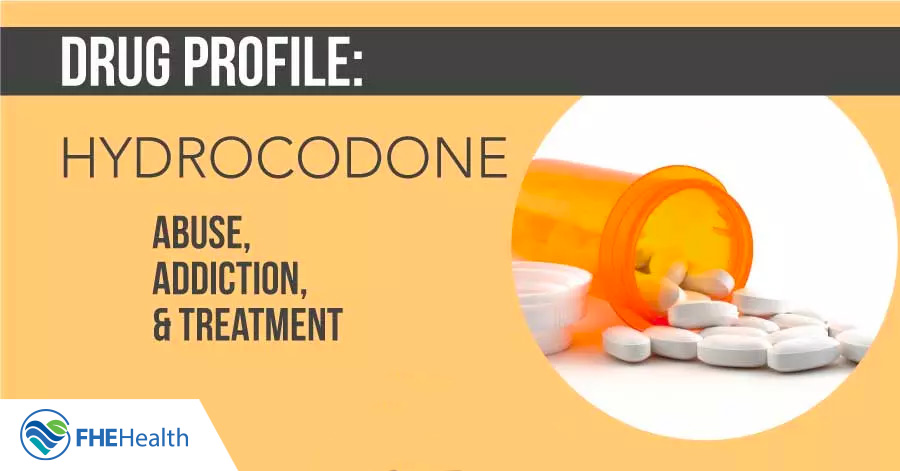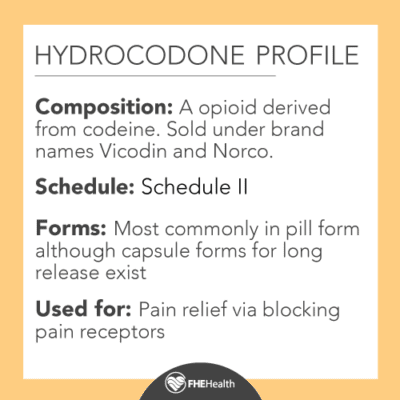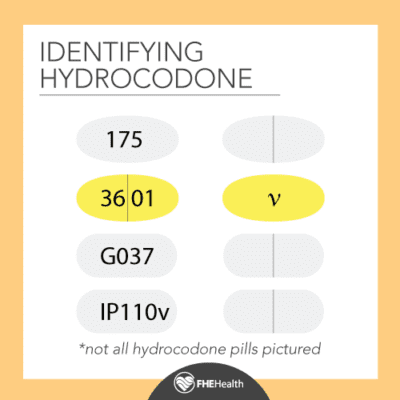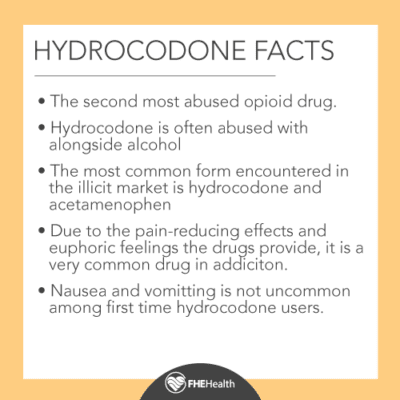
|
|
 Hydrocodone is a type of opioid drug and the second most frequently seen narcotic in illegal drug activity, according to the Drug Enforcement Agency (DEA). The drug was prescribed over 19 million times in the United States for people over the age of 12 in 2019, most commonly for pain relief. About 5.5 million people are estimated to have abused it. Abuse of hydrocodone occurs when the drug is overused or a significantly higher dose of the prescription drug is taken, especially on a routine basis.
Hydrocodone is a type of opioid drug and the second most frequently seen narcotic in illegal drug activity, according to the Drug Enforcement Agency (DEA). The drug was prescribed over 19 million times in the United States for people over the age of 12 in 2019, most commonly for pain relief. About 5.5 million people are estimated to have abused it. Abuse of hydrocodone occurs when the drug is overused or a significantly higher dose of the prescription drug is taken, especially on a routine basis.
At FHE Health, we help many patients suffering from hydrocodone addiction. Our team offers comprehensive treatment for this type of substance use disorder.
What Is Hydrocodone?
Hydrocodone is the main ingredient found in numerous types of painkillers. Doctors prescribe this narcotic for relief of moderate to severe pain, usually only for short-term use due to dental or injury-related pain. In 2019, doctors wrote 246.8 million prescriptions for hydrocodone-related products, according to the DEA.
Used over time, hydrocodone can contribute to the development of addiction. Considered an opioid or a semi-synthetic opiate, this drug works much like codeine, oxycodone and morphine. It’s possible to overdose from consuming too much or due to long-term, chronic use. Celebrities such as Philip Seymour Hoffman, Anna Nicole Smith and Bruce Lee are believed to have died from overuse of this type of pain medication.
Treatment can begin quickly and discreetly, get started now Most commonly used in a pill form, the tablets range from small, pink oval pills to white capsules. Most tablets contain 2.5 to 10 milligrams of hydrocodone, sometimes paired with acetaminophen or other drugs. In this form, it may be called Norco or Lortab. Doctors may also prescribe extended-release forms in capsules and tablets to treat chronic pain. Hydrocodone works to treat pain by changing the way the brain and the central nervous system respond to discomfort. It works by shutting off the brain’s pain communications and giving the person a sense of relief. It doesn’t improve an injury or treat a disease. If it’s combined with acetaminophen, as many prescriptions are, it can also work to reduce fever. Doctors commonly prescribe the lowest dosage they think will work for the shortest period of time the patient needs in an effort to reduce the risk of developing dependency. Increasing the amount taken may offer some relief for pain not otherwise treated. Most prescriptions for hydrocodone are written for between 3 and 7 days. The drug isn’t recommended for long-term use due to the high risk of dependency. The dosage level and configuration of the drug determines how long it remains in a person’s system. Most formulations begin to work within 20-60 minutes for most people. Many prescriptions are written to include several doses a day, since a single dose typically works for somewhere between 4 and 8 hours. After the effect wears off, hydrocodone is then metabolized by the liver and evacuated in the urine, where it shows up as an opioid on a 5-panel urinalysis test. People who abuse hydrocodone often exhibit troubling behavior, such as: Addiction to hydrocodone is distressingly common for people who were initially prescribed the drug for pain but then developed a dependency. This occurs in part because hydrocodone creates connections to the proteins located in the spinal cord and brain called opioid receptors. While this is effective in stopping pain signals, it also tends to create a euphoric feeling. People who use the drug for this effect are at a heightened risk of addiction. Hydrocodone addiction risk is exacerbated by the fact that it takes the body a long time to form a tolerance for the drug. That means you can take relatively small doses for extended periods and get something close to the initial high without the immediate risks and other downsides of heavy use. This encourages continued use and a deepening addictive spiral. The most common danger of using hydrocodone is that it creates dependency in the brain. Dependency occurs when a person’s body requires the substance to function properly and without pain. Dependency is different from addiction, since addiction is defined by the social cost of abusing the drug, but both can occur. Long-term or heavy use of hydrocodone increases the risk of overdose. If you believe your loved one has an addiction to hydrocodone, it’s important to seek out immediate care due to the high risk of overdose. Common signs of hydrocodone use include: Anyone, even those taking hydrocodone for the first time, may experience these symptoms. Abuse frequently occurs when these side effects become more common. When a person is abusing hydrocodone for a short period of time, they may see those symptoms escalate into higher risk effects. Overdose can occur at any time, even when a person is using the drug for a short period. Hydrocodone abuse side effects in the short term include: A person who uses the drug over a long period of time is at risk for side effects and health risks such as: As is common for treatment of opioid addiction, many patients start out with a medically supervised detox program that’s done under controlled circumstances at a clinic or hospital. This process generally takes 3-10 days, but that depends on a number of factors, including: After the initial detox period, it’s common for hydrocodone users to spend some time getting inpatient rehab. This can run from 30-90 days, again depending on a lot of factors. The acute symptoms of withdrawal usually last this entire time, so daily counseling and group sessions are common. The goal of this stage of rehab is to gradually get you to the point where you’re ready to leave the facility and return to a sober life outside. After the transition, your care plan will usually include outpatient visits at least weekly but probably more often than that at first. As part of the normalization at this stage, you’re likely to meet with a 12-step program and get a sponsor who can support you in sobriety. You may also get relationship and lifestyle counseling, which may include cognitive behavior therapy to break old habits and adjust your life to reduce the risk of relapse. We offer 100% confidential and individualized treatment It’s never too early to start treating hydrocodone addiction. If you’re using the drug outside of your doctor’s recommended schedule or taking it for longer than prescribed, you may be abusing the substance. If you get sick without it or you’re afraid to try going without your next dose, these are strong signs of a growing chemical dependency. If you’re continuing to use despite mounting negative consequences, you’re showing classic signs of having an addiction. The earlier you start work on treating an addiction, the more likely you are to succeed and the less damage the drug is likely to do while you’re taking it. Signs a person should look into hydrocodone addiction treatment include: A key reason to seek out professional counseling for hydrocodone addiction is because it can have significant withdrawal symptoms. In those who’ve used the drug for a long time, withdrawal symptoms can be life-threatening. Care in a medically monitored program for detoxification is necessary. Withdrawal symptoms may include: If any type of withdrawal symptoms occur when you do not get the drug, this is an indication of dependency that requires addiction treatment. Hydrocodone, as well as all opioid drug addictions, can be treated at FHE Health. We offer inpatient and outpatient care for men and women struggling with substance use disorders like this. Care starts with a private, no-obligation consultation over the phone. If you or a loved one needs addiction treatment, contact our admissions team today. Kristina Robb-Dover is a content manager and writer with extensive editing and writing experience... read moreNeed Help?
How Do You Identify Hydrocodone?
 Hydrocodone is sold in a number of ways, including through several brand names such as Vicodin, Norco, Lortab and Zohydro. There are dozens of other brands and generic products sold with various amounts of hydrocodone in them. Slang terms for the drug include codone drug, codone pills, hydro pills, m 365 pill and many others.
Hydrocodone is sold in a number of ways, including through several brand names such as Vicodin, Norco, Lortab and Zohydro. There are dozens of other brands and generic products sold with various amounts of hydrocodone in them. Slang terms for the drug include codone drug, codone pills, hydro pills, m 365 pill and many others.What Does Hydrocodone Do?
How Common Is Addiction to Hydrocodone?
What Are the Dangers of Using Hydrocodone?
Hydrocodone Abuse — How Can You Tell?
What Are the Signs of Hydrocodone Abuse?
What Are the Short-Term Side Effects and Risks of Hydrocodone Use?
What Are the Long-Term Side Effects and Risks of Hydrocodone Use?
What Are Treatment Options for Hydrocodone Substance Abuse?
More Questions about Treatment?
When Is Hydrocodone Addiction Treated?
What Are the Withdrawal Symptoms From Hydrocodone and Detox Needs?
Hydrocodone Treatment at FHE Health
![]()
About Kristina Robb-Dover







